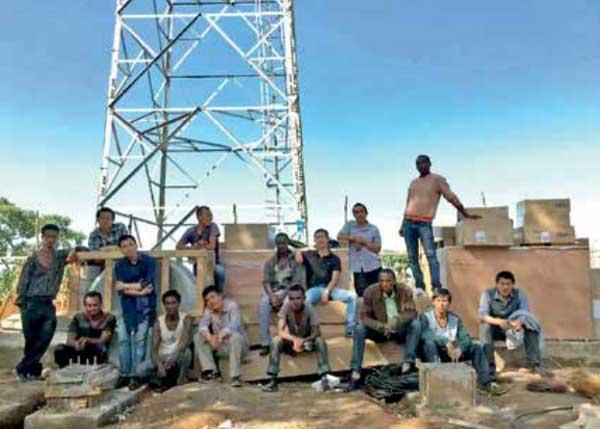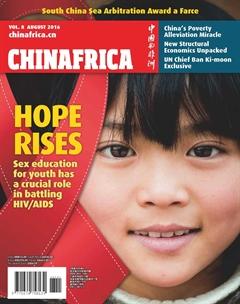A Gift From the Orient
By Ge Lijun

In nekemte, a town located in west Ethiopias Oromia State, a truck laden with telecommunication equipment is stuck fast in the mud. The small group of men accompanying it pushes as one and their faces glisten with sweat with the effort. But the truck refuses to budge.
Then the two Chinese in the group, Wang Yang and Hu Shenghua, quickly call everyone for consultations and reinforcements are sent for. The “reinforcements”are a sturdy donkey and once it arrives, the load is transferred from the truck onto its back.
Necessity is the mother of invention and during Wangs four years in Ethiopia, working for ZTE Corp., one of Chinas largest telecom equipment providers, he has learned to deal inventively with bad roads, no roads or collapsing bridges. For him and Hu, Regional Manager of ZTE in Ethiopia, getting stuck in muddy roads is a frequent experience.
“Sometimes there are no roads to transport our equipment and sometimes the bridge collapses. In such situations, we have to depend on donkeys and manpower,” Wang said.
The 26-year-old Wang is ZTEs Nekemte project manager and his current work is upgrading and renovating over 200 telecom base stations in Nekemte, a task he needs to complete in two months.
Difficult but rewarding
Founded in 1985, ZTE has been providing its services to businesses and public-sector companies around the world. It entered the Ethiopian market in 2000, the first Chinese telecom company to do so.
After the Forum on China-Africa Cooperation Summit in Beijing in 2006, the Ethiopian Government issued a development plan, envisioning promoting the local economy by enhancing telecommunication facilities. At that time Ethiopias communication network was underdeveloped and this spelled an opportunity for ZTE.
With the financing support of the Chinese banks, ZTE obtained the contract to install next-generation network (NGN), an upgraded telecom system, in Ethiopia. The first challenge it faced was to expand the network capacity in capital Addis Ababa within five months to support Ethiopias millennium celebrations in September 2007.
According to international conventions, such large projects generally take one to two years for execution and operation. However, keen to prove its capability, ZTE accomplished the project before the due date by massively upping personnel and material resources.
“The project won a good reputation for ZTE in Ethiopia,” Wang said.
After this tough but good start, ZTE began to undertake more communication projects in Ethiopia, contributing to it becoming one of the most advanced African countries in terms of communication network.
Before 2006, Ethiopias wireless network capacity was less than 1 million lines with about 700,000 users. But by 2016, after ZTE had set up Ethiopias national communication network, the nations wireless network capacity grew to 70 million lines with the number of users rising to 45 million. Mobile communication coverage jumped to 85 percent.
ZTE has constructed about 6,000 communication base stations in Ethiopia, which currently enable over 45 million Ethiopians - nearly half the population - to use mobile phones.
“In the past, we only had fixed-line phones and there were no mobile phones. The NGN program ZTE undertook is a new era for users in Ethiopia,” said Andualem Admassie, CEO of Ethio Telecom, Ethiopias state-run sole telecom operator.
Now, Wang and Hu are responsible for Nekemtes network upgrading. Wang thinks ZTE is the best choice to undertake the work. “We are required to realize over 90 percent national third-generation network coverage, but we guarantee 100 percent,” Hu said proudly.
With Ethiopias communication level improving, its economy is rising too. The increased communication network promotes better information exchange on agricultural products and handicrafts, resulting in better sales and boosting the local economy.
The network program is also stimulating the development of telecom-related industries in areas such as engineering installation, civil engineering construction and fiber optic cable engineering.
Virtue of dedication According to the World Banks estimation, Ethiopias economy will increase by 10.5 percent by this year. The government was pursuing 11 percent annual growth for five years before 2015. Ethiopia today is one of the fastest growing countries in the world.
In the past decade, ZTE has become an important partner of Ethio Telecom. Aytenfisu Worku, Chief Human Resource Officer at Ethio Telecom, said in the fierce competition with European companies, ZTE stands out due to its efficiency and ability to work hard.
“Our programs are [usually] very difficult, tight and huge, and we have to go to the rural areas. You need dedication for that. When it comes to dedication, you can see the clear difference between Europeans and the Chinese,” Worku said.
Zerihun Tumicha Belguda, Director of the Nekemte Telecommunications Bureau, expressed his satisfaction with the way ZTE was upgrading the telecom base stations.
“Before, we needed more than a month to construct a telecom tower. But the Chinese take only three to four days,” Belguda said. “We have learned how to be more efficient and hardworking from the Chinese.”
“In the eyes of the locals, ZTE workers are very diligent. They liken the Chinese to the busy bees who fly everywhere to gather honey every day,” Hu said. “The locals ask me, why are the Chinese so hardworking? I tell them China used to be a poor country. If you know the history of China in difficult times, you will understand why the Chinese have dedication.”
There are other touching little ways in which ZTE workers hard work is recognized by Ethiopians.
One day, when Wang was working at a base station, a little boy ran up to him and greeted him in Chinese. Wang was amazed. He asked the boy where he had learned Chinese. The boy told him he had learned the phrase from his fathers smartphone.
“I asked him whether he knew who had helped[Ethiopia] build the telecommunication network, and he said it was the Chinese,” Wang said delightedly.“While our work is bringing big changes to Ethiopianslives, we have also gained a lot in this process.”

